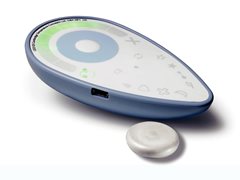 A delighted couple revealed today they were the first to conceive with an IVF alternative dubbed the 'fertility sat nav'.
A delighted couple revealed today they were the first to conceive with an IVF alternative dubbed the 'fertility sat nav'.
Marie and Mirco Martinelli believed they would never be able to have children after suffering three miscarriages in just two years.
They signed up for IVF but were told there was a two-year waiting list for treatment. So they took part in a trial for DuoFertility, a ground-breaking temperature measuring device that promised pregnancy within 12 months.
They began using the £495 device in January 2009 and were delighted when Marie became pregnant after just seven months.
Baby Alec was born on March 20 this year and is the first baby to be born through the device - which claims to be statistically as good as IVF.
Secretary Marie, 29, who lives in Italy with Mirco, 37, and little Alec, now seven months, said she was "so happy" they had used the device.
She said: 'I was very worried and sad when I kept having miscarriages. The whole world was pregnant and had babies and I struggled to get pregnant and couldn't stay pregnant.
'DuoFertility stopped me thinking of myself as having a problem, and suddenly I was able to sleep more normally and feel a great deal calmer.
'Where the product calculates your fertile days after a few months, it was impossible for me to have been able to do that properly without proper scientific approaches, because my cycle was different all the time.
'In the past I had tried ovulation tests, but if you have to use them for a long time it becomes very expensive.' Dutch Marie - who met Italian Mirco in Italy in Summer 2002 - suffered her first miscarriage after six weeks of pregnancy in March 2005.
In May 2005, the couple visited a fertility clinic, which broke the news that Marie had abnormal hormone levels.
They lost another baby at 13 weeks in February 2006 and another at 11 weeks in September the same year, before deciding to take a break from trying.
In May 2008 Marie and Mirco married in Italy and decided their only option was to use fertility treatment - but lost hope when they were told of the lengthy waiting list for IVF.
Shortly after, Marie noticed an advert for DuoFertility - a small patch the size of a coin which takes 20,000 temperature readings every night to pinpoint the exact moment of ovulation.
She began using the product in January 2009 and was delighted when she fell pregnant just months later.
Alec was born in Italy at 1.54am on March 20 after a gruelling 19 hour labour.
Marie added: 'When they showed me Alec I couldn't believe he was my son. I remember he was so warm and soft.
'Micro was full of joy and happiness and also could not believe that this was his son. Still now we can't believe that this little person is our baby.
'When they brought me back to my room and laid Alec at my breast I was so proud. Finally, my little boy.' DuoFerility was developed by scientists and fertility experts at Cambridge Temperature Concepts in 2008.
The non-invasive device comprises of a tiny patch thermometer - the size of a £1 coin - that is worn under the arm.
It promises to alert a woman to the moment her temperature rises half a degree as a result of ovulation.
A small wireless hand-held reader processes data from the patch to tell the wearer whether she has ovulated in the last two days and whether she is likely to in the next six.
Women are most fertile on the day of the temperature spike and on the few days before - meaning chances of conception are massively increased by trying on those days.
Information from the reader can be loaded onto a computer, which allows couples - and experts in Cambridge - to analyse the monthly fertility cycle.
Dr Shamus Husheer, who invented the device said the company was "delighted" with their success and the birth of baby Alec. He said: 'What we now know as a result of our work, is that for certain causes of infertility, DuoFertility is as effective as IVF.
'Clearly there are some infertility issues where the use of the device is unable to aid pregnancy such as a complete lack of sperm, however for a range of common causes such as moderate male factors, cycle irregularity, secondary or unexplained infertility, our monitoring device is achieving great results.'
Article: 1st December 2010 www.dailymail.co.uk
Read more about Male Fertility Kits and Female Fertility Kits.